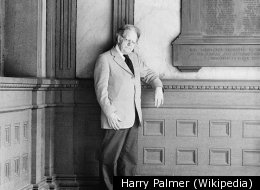 OTTAWA - Canada's intelligence service spied on renowned literary scholar Northrop Frye, closely eyeing his involvement in the anti-Vietnam War movement, an academic forum on China and efforts to end apartheid in South Africa.
OTTAWA - Canada's intelligence service spied on renowned literary scholar Northrop Frye, closely eyeing his involvement in the anti-Vietnam War movement, an academic forum on China and efforts to end apartheid in South Africa.Newly released archival records show the RCMP Security Service relied on a secret informant to help compile a 142-page file on the esteemed University of Toronto professor, who died in 1991 at age 78.
Every inch the owlish, bespectacled academic, Frye seems an unlikely counter-intelligence target.
But the Mounties, wary of anyone deemed influential among the burgeoning New Left, amassed hundreds of thousands of files during the Cold War -- monitoring key institutions such as universities, the media, churches and political organizations.
The scandal-ridden RCMP spy agency was disbanded in 1984 and replaced by the civilian Canadian Security Intelligence Service.
The Canadian Press obtained the intelligence dossier on Frye from Library and Archives Canada under the Access to Information Act. RCMP files on individuals can be disclosed only 20 years after the person's death.
The material covers the years 1960 through 1972, after Frye had forged a reputation as one of the pre-eminent western intellectuals.
Several pages of the Frye file -- though close to half a century old -- were completely withheld from release because they contain personal information about others or material still deemed sensitive to Canada's security.
Herman Northrop Frye was born in Sherbrooke, Que., and raised in Moncton, N.B. Though an ordained minister, he settled into the academic arena, publishing a path-breaking interpretation of William Blake's poetry in 1947. He followed it a decade later with a highly influential work on the essence of literary criticism.
He was named to the Order of Canada in 1972 and posthumously appeared on a postage stamp.
Today his contributions are recognized through the University of Toronto's Northrop Frye Centre and an annual literary festival in Moncton.
The Mounties seemed to first take note of Frye in 1960, when he served as a sponsor of the Toronto Disarmament Committee. In 1963, the RCMP flagged Frye's participation -- along with luminaries including communications theorist Marshall McLuhan and political scientist C.B. Macpherson -- in the planned Norwegian quarterly Co-existence.
A three-page March 1967 memo detailed Frye's biographical details, relying on a secret source for information about his wife.
The investigator noted Frye "has come to our attention" on a number of occasions, including involvement in a letter questioning Canada's complicity in the Vietnam conflict, and his role on the honourary board of an international educational forum -- or "teach-in" -- on China at the University of Toronto in 1966.
"Our source felt his participation gave the Teach-in a note of credibility," says the RCMP memo.
Former Liberal leader Michael Ignatieff, who participated in the forum on China as a student, said he would have been astonished at the time to know the Mounties were watching.
"I'm not going to second-guess the RCMP, but the fact was, you know, when I was 19, 20 years old, what I knew about Norrie Frye was, he was probably the greatest living Canadian thinker, right? He and Marshall McLuhan," Ignatieff said in an interview.
"And it was unbelievably exciting to have Frye and McLuhan within a country mile of you."
Frye's high profile would have intensified RCMP interest, said Steve Hewitt, who teaches in the Department of American and Canadian Studies at the University of Birmingham in England.
"I think that makes him more dangerous in their eyes, because he is a prominent individual with influence and a public presence, and someone that could arguably sway public opinion," said Hewitt, author of Spying 101: The RCMP's Secret Activities at Canadian Universities, 1917-1997.
The 1967 biographical memo, prepared by an RCMP constable, reveals that at least one thing stumped the spies.
"At the present time, we are unable to ascertain what the initial 'H' stands for in Frye's name."
Hewitt believes there was "an element of make-work" to the RCMP Security Service's sprawling efforts to keep track of the many social causes that sprang up during the period.
"They've got to find things to do to justify their existence," he said. "Maybe junior officers are going out to collect this information, trying to get every little tidbit that they can."
Though he took a progressive stand on issues of the day, including the battle against racial segregation in South Africa, Frye expressed skepticism about the left-wing student movement flowering on campuses in the '60s.
He told a convocation address in Wolfville, N.S., in 1969 that demonstrations would soon wither away, with little to show for the marches and placard-waving.
Origin
Source: Huffington
No comments:
Post a Comment